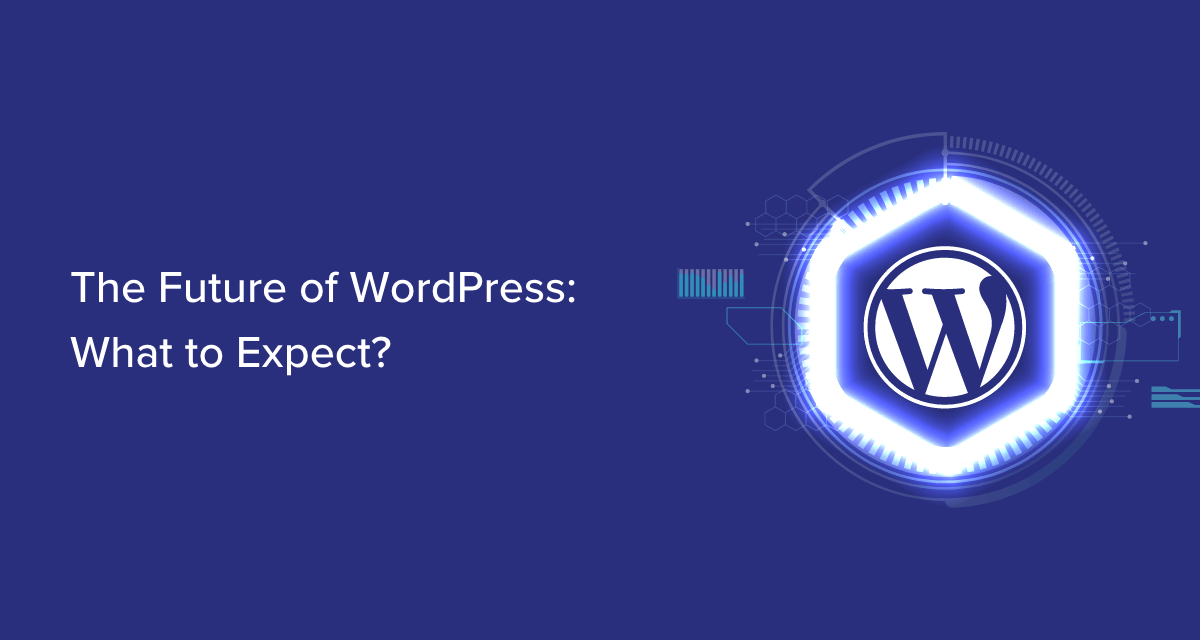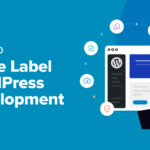Are you curious about the future of WordPress?
With the first 20 years of WordPress history behind us, the platform is already powering 43% of websites. Over the years, WordPress has continued to grow and evolve to meet the changing needs of website owners. But what can we expect in the future?
In this article, we will talk about the future of WordPress and what you can expect.
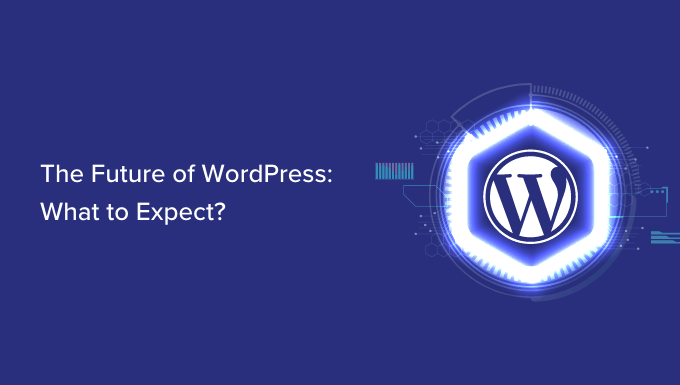
What Improvements Can We Expect From WordPress in the Future?
WordPress was launched in 2003 by Matt Mullenweg and Mike Little. Now that there are over 20 years of WordPress history behind us, you may be wondering what’s coming next.
The future of WordPress is important because it is the content management system (CMS) behind 43% of all websites, including big-name brands like Sony, CNN, Time Magazine, and Disney.
You can expect WordPress to stay modern and relevant and become even easier to use. WordPress is designed to be simple and adaptable, and WordPress developers are already looking a long way down the road and have a detailed roadmap.
In fact, at a recent WordCamp, WordPress co-founder Matt Mullenweg shared that he expects WordPress to be still going strong a century from now.
I could see WordPress being around—not just around, but core to the fabric of the web—100 years from now, and I would love to attend a WordCamp Asia in my 80s.
Matt Mullenweg, WordPress Co-founder, WordCamp Asia 2023
With that being said, let’s take a look at what to expect in the future of WordPress. You can use the links below to jump to the sections you are most interested in:
1. Continued Popularity of WordPress
WordPress is very popular. It currently powers 43% of all websites, which translates to 810 million websites in total. This number has also grown a lot when you consider that WordPress was used to build only 29% of websites in 2018.
Besides that, WordPress holds nearly 65% of the global CMS market share. The following chart shows every content management system with more than 1% usage. Nothing comes close to WordPress.
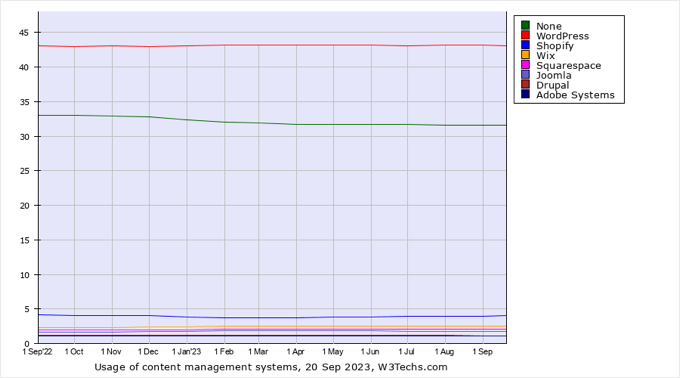
These statistics haven’t gone unnoticed. WordPress has been chosen by the most successful companies in the world. In fact, 38% of the top 10,000 websites are powered by WordPress, including big-name brands like Disney, Sony, Facebook, and more.
As you can see, WordPress currently dominates the website market, and this trend will continue in the future.
WordPress market share numbers have been steady for some time, and other CMS options have also remained steady without large spikes of growth. We expect WordPress will remain popular well into the future.
We can be confident because WordPress is built by a community and doesn’t rely on a single company for its success.
The WordPress community is made up of developers, designers, and WordPress enthusiasts who contribute to its core development, plugin creation, and theme design.
As WordPress evolves, so will the community that supports it. This will make sure that the platform remains a powerful and accessible tool for individuals, businesses, and organizations.
Why not become an active part of the WordPress community? You can get started by simply attending WordCamp or a local meetup. To learn more, see our guide on how you can get involved with the WordPress project.
2. The Growth of WordPress for eCommerce
eCommerce is a rapidly growing industry, and the availability of WordPress eCommerce plugins makes WordPress an excellent choice if you are starting an online store.
There are currently more than 5 million websites powered by the WooCommerce plugin. It has a market share of around 39% among eCommerce solutions, above Shopify, Squarespace, Wix, and others.

That makes WooCommerce the most popular eCommerce platform right now, and its market share has had an upward trend over time. This means we can expect more people to keep using it into the future.
Of course, WooCommerce isn’t the only eCommerce solution for WordPress. If you don’t need a full-blown online store, then you can choose a different eCommerce plugin like Easy Digital Downloads or WP Simple Pay.
Overall, we expect to see faster adoption of WordPress for eCommerce in the future. It’s clear that while WordPress is maintaining its position as a leading website builder, it is also expanding its eCommerce market share.
3. More Artificial Intelligence in WordPress
Matt Mullenweg spoke about artificial intelligence during his AMA (Ask Me Anything) at WordCamp Asia 2023. He sees the potential of AI technologies and encourages people to embrace them to create software, websites, and web content.
But he also recognizes the current limitations. He warns that artificial intelligence is still very young and has a lot of room for improvement. We are also not sure how the economic implications of AI will play out in the future.
So you can expect artificial intelligence to be added to the WordPress core eventually, but not until it’s ready.
In the meantime, you can take advantage of WordPress plugins that use AI. For example, All in One SEO (AIOSEO) has a ChatGPT integration that helps you make SEO post titles and meta descriptions.
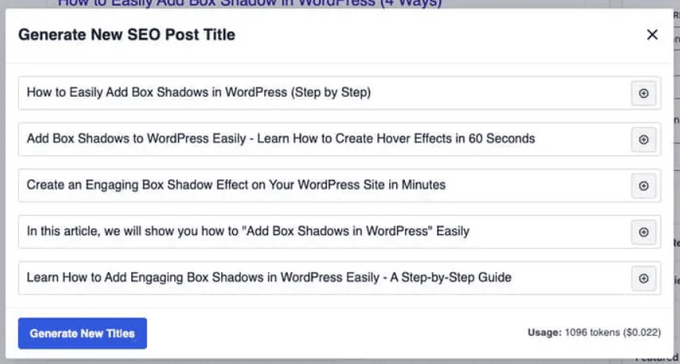
Right now, you can also use AI to help you:
- Produce well-researched content
- Come up with more powerful headlines
- Improve your website SEO
- Generate images for blog posts
- Automatically answer common customer questions
- and more
In the future, we expect artificial intelligence plugins to become even smarter, giving us better AI website builders, new content tools, more intelligent chatbots, and advanced automated workflows.
4. Easy Collaboration on Multi-Author Blogs
WordPress is about to become more collaborative, adding features needed by multi-author blogs and eLearning sites. This is part of Phase 3 of the Gutenberg project, which is in the planning stage as we write.
For example, WordPress will allow multiple authors to work on the same article at the same time. Think of the experience you have using Google Docs but from your WordPress dashboard.
Authors and editors will be able to write notes to each other and suggest potential edits. You will be able to annotate specific blocks or sections of content and take part in threaded discussions right inside the WordPress content editor.
Website owners will also be able to create editorial workflows for their content team and plan upcoming content on a calendar. Content approval workflows will make sure that specific users or roles will need to review and accept posts before they can be published.
Life is going to become much smoother on multi-author blogs.
5. Multilingual Support in WordPress Core
Since WordPress is used on 43% of the world’s websites, these sites and their content need to be accessible to a global audience. And that means WordPress needs to provide support for multiple languages.
Multilingual websites serve the same content in many different languages. You can allow users to choose their preferred language using a dropdown link, or you can automatically change the website’s language based on the visitor’s geographic location.

Currently, you need to use multilingual plugins to achieve this. Unfortunately, not everyone has the time to install and configure these plugins, and they may have some impact on WordPress performance.
Another problem is that the developers need to maintain each plugin independently, support their users, and keep adding more languages. That’s a lot of work, and it makes sense for multilingual WordPress to become a centralized effort within WordPress core.
That’s the goal of Gutenberg Phase 4, which will launch in 2024 or 2025. It will start to add much-needed multilingual features to the WordPress core.
To start with, WordPress will enable you to manually translate your content into languages of your choice and allow visitors to read the content in a language they can understand.
In time, as the technology improves, WordPress will be able to translate your content on the fly so that it will be automatically available to anyone who reads a supported language.
This will make your content accessible to a global audience, significantly improving your reach and bringing more traffic to your website.
It will also continue to make WordPress even more relevant and popular as we move into the future, as it will be available to everyone, no matter what language they speak.
6. WordPress Legacy Websites, Products, and Companies
As we said at the beginning of this article, WordPress co-founder Matt Mullenweg is looking 100 years into the future as he considers where WordPress is heading.
He suspects that website owners may also have long-term goals for their online projects.
For example, business owners may want to keep permanent documentation of their company’s history. Families might be anxious not to lose valuable photographs and stories. Website owners may also value a permanent online home that adapts to the needs of the future.
As a result, WordPress.com is offering a 100-year “legacy” plan that you can purchase with a single payment. It includes domain name registration and web hosting for the next century.
This will allow users to maintain their online histories without worrying about what will happen when they are gone. Legacy plans can also inspire businesses to think in the extended long term, beyond a typical 5 or 10-year plan.
While WordPress.com isn’t the same as self-hosted WordPress.org, this move toward long-term website hosting plans could signal changes within the overall WordPress ecosystem.
This new plan can set an example for top WordPress hosting providers and plugin developers. They may be inspired to think about marketing their products for very long-term use and building a “legacy”.
It could also change the way that WordPress companies think about their long-term goals. Offering internships and job opportunities to employees’ children and grandchildren could be a more sustainable way to grow a business over time.
FAQs About the Future of WordPress
Before we finish this article, let’s answer a few questions we are regularly asked by our readers about the future of WordPress.
Is WordPress still relevant?
WordPress is now over 20 years old, and new competitors pop up every year. For this reason, some people ask whether WordPress is still relevant.
Since WordPress powers 43% of all websites, it’s more relevant than ever. We hope this article has shown you that it will go on being relevant for decades to come.
We clearly outline why WordPress is relevant and why you should choose it in our guide on the most important reasons to use WordPress.
Is WordPress dying?
With all of its success, some people question how long WordPress can stay on top. There are many rumors that WordPress may die out and stop being popular.
However, when you look at the facts, these rumors are simply not true. There are absolutely no signs that WordPress is dying or its loyal users are about to abandon it.
We have written a detailed guide on the state of WordPress and clearly answered ‘No’ to the question: Is WordPress Dying?
Is WordPress that bad?
You may have heard a tech consultant or a YouTube influencer claim that WordPress is bad.
You might ask, ‘If WordPress is really that bad, then why is it so popular? Why do nearly half of all websites on the web use it?’ The fact is, it’s not bad at all.
That’s why we wrote a detailed guide called Is WordPress Really That Bad? We take a look at common reasons people claim WordPress is bad to help you make the right decision.
What is the future of WordPress careers?
If you are thinking about getting a career in WordPress, then you may be wondering about job security. Will WordPress jobs still be around in the future?
The good news is that the demand for WordPress professionals remains high due to the platform’s popularity and constant growth. Plus, there are lots of WordPress careers for individuals with a wide range of skill sets.
You can learn how to make a living with WordPress in our complete guide to WordPress career options.
We hope this tutorial helped you learn about the future of WordPress. You may also want to see our guide on important reasons why you should use WordPress for your website or our expert picks of the best AI chatbot software for your website.
If you liked this article, then please subscribe to our YouTube Channel for WordPress video tutorials. You can also find us on Twitter and Facebook.
The post The Future of WordPress: What to Expect (Our Predictions) first appeared on WPBeginner.

